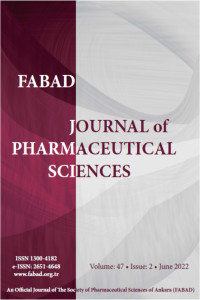Abstract
References
- Akbaba, H., Erel Akbaba, G., & Kantarcı, A. G. (2018). Development and evaluation of antisense shRNA-encoding plasmid loaded solid lipid nanoparticles against 5-α reductase activity. Journal of Drug Delivery Science and Technology, 44(August 2017), 270–277. https://doi.org/10.1016/j.jddst.2018.01.001
Abstract
nanoparticles (MNPs) under the influence of a magnetic field;
gives promising results for gene delivery. However, pharmaceutical
and biomedical studies in this area are very limited. To meet this
need, we aimed to develop an effective magnetic gene delivery system
in this study. The in-situ surface coating method was handled to
develop cationic charged MNPs. Three different MNP formulations
were obtained and investigated in terms of characterization, DNA
binding, protection, and transfection ability. According to the
results, the obtained MNPs have particles under 150 nm with a
low PDI (<0.3), and positive zeta potential with a spherical shape.
The DNA binding and protecting ability from nucleases were shown
by agarose gel studies. No significant cytotoxicity was observed on
COS-7 cells in the concentration range of 4-20 μL/well. Moreover,
transfection studies revealed that the optimal system (GMS-MNP-1)
showed significantly higher transfection efficacy comparing the naked
plasmid or non-magnetic version of nanoparticle under a magnetic
field (p>0.05). Promising results have been obtained with the use
of obtained GMS-MNPs in terms of magnetic gene delivery. This
work can be extended to in vivo by using disease-specific therapeutic
genetic materials.
References
- Akbaba, H., Erel Akbaba, G., & Kantarcı, A. G. (2018). Development and evaluation of antisense shRNA-encoding plasmid loaded solid lipid nanoparticles against 5-α reductase activity. Journal of Drug Delivery Science and Technology, 44(August 2017), 270–277. https://doi.org/10.1016/j.jddst.2018.01.001
Details
| Primary Language | English |
|---|---|
| Subjects | Pharmacology and Pharmaceutical Sciences |
| Journal Section | Research Article |
| Authors | |
| Publication Date | August 1, 2022 |
| Submission Date | January 17, 2022 |
| Published in Issue | Year 2022 Volume: 47 Issue: 2 |

